Once you are sure your hummies have gone for the season (boo!), you can safely bring in your feeders to clean and store for the winter. I haven't seen a hummingbird for a few weeks, so I finally brought in the feeders.
By this time of year, the feeders are usually worse for wear. During the summer, they get thoroughly cleaned every few days, but in the fall when the days are cooler, the sugar water lasts longer, and the number of hummingbirds dwindle, I guess I get a bit lazy and the feeders can get rather dirty. I'm embarrassed to show you how dirty they are, but here's what they looked like when I brought them in ...
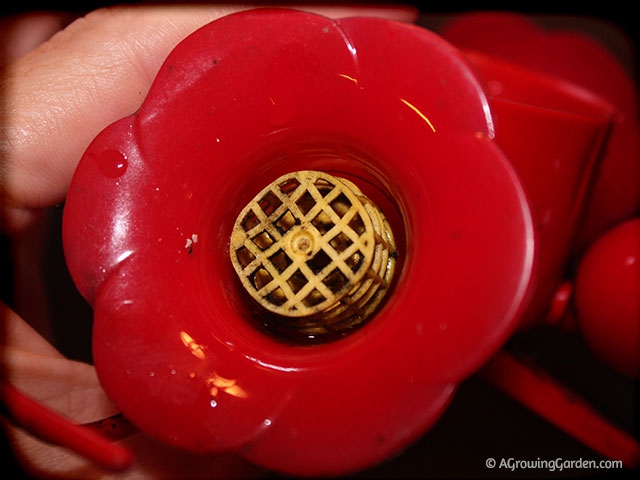
I know... YIKES!
Anyway, no worries. I cleaned them really, really, really well (there was bleach involved and old toothbrushes for scrubbing!) and they are now drying and will be ready to be put away soon.
I like to thoroughly soak and clean the hummingbird feeders before putting them away for the winter. That way, they'll be squeaky clean and ready to go the second I see my first hummingbird in the spring... you know, when I'm too busy jumping for joy and don't have time for cleaning them.
So, I clean the feeders with a bleach & water solution and then scrub them with a toothbrush and bottle brush. Sometimes I go this route during the summer too... it just depends on how dirty the feeders are. Sometimes they need bleach and scrubbing during the summertime, and sometimes not. But, for the final fall cleaning, bleach & scrubbing is essential!
Here are the cleaning steps I take before putting the hummingbird feeders away for the winter.
Step 1: Fill a large bucket with water. Add 1/4 cup of bleach for each gallon of water.
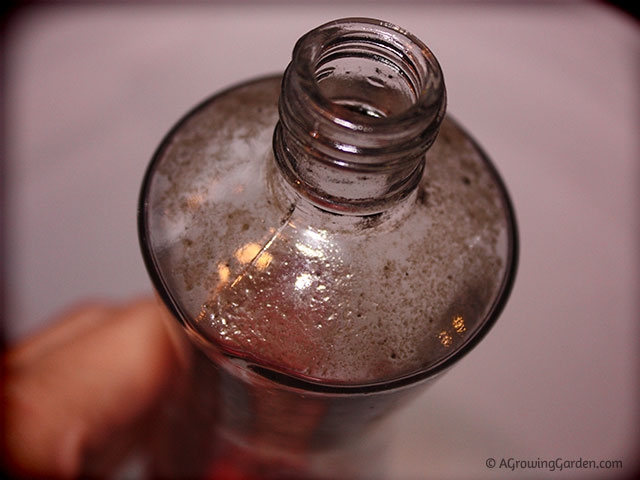
Step 2: Remove the glass bottle from the base of the feeders. Cringe at how dirty everything is. Place the glass bottles into the bleach solution.
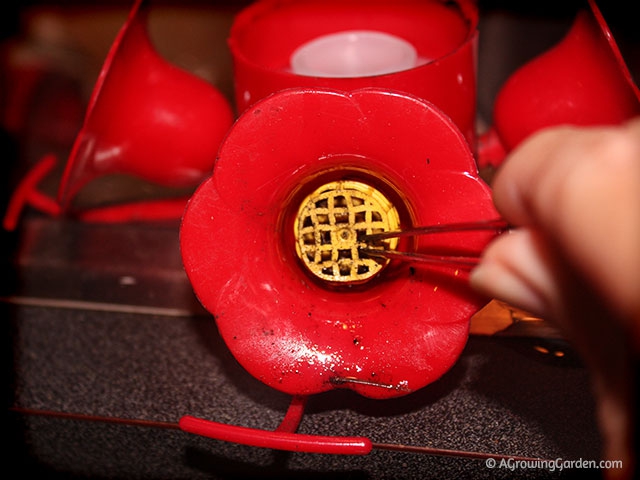
Step 3: Remove the bee guards if your feeder has them. I use sharp tweezers to remove the bee guards, but you can use your fingers too if you are super dexterous. Cringe again at how filthy the bee guards and the base unit are and vow to never, ever let the feeders get that dirty again.
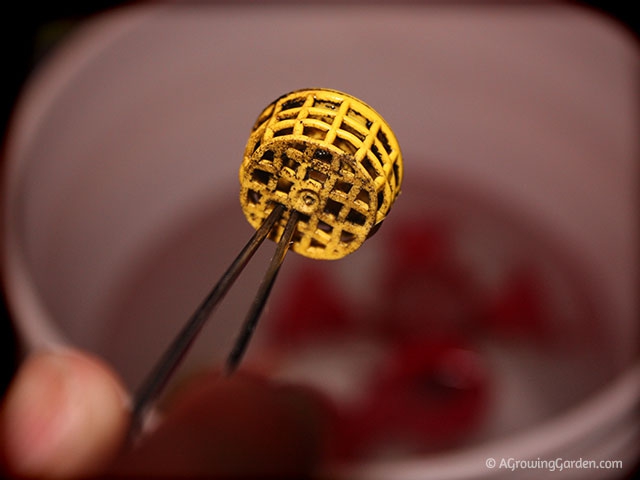
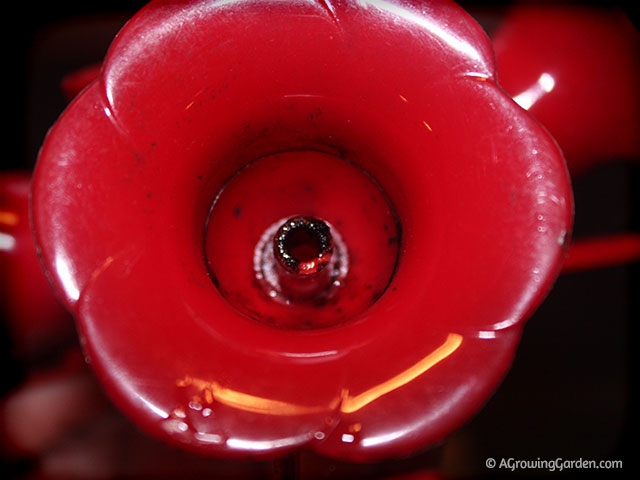
Step 4: Place the base units and the bee guards into to the bleach solution with the glass bottles.
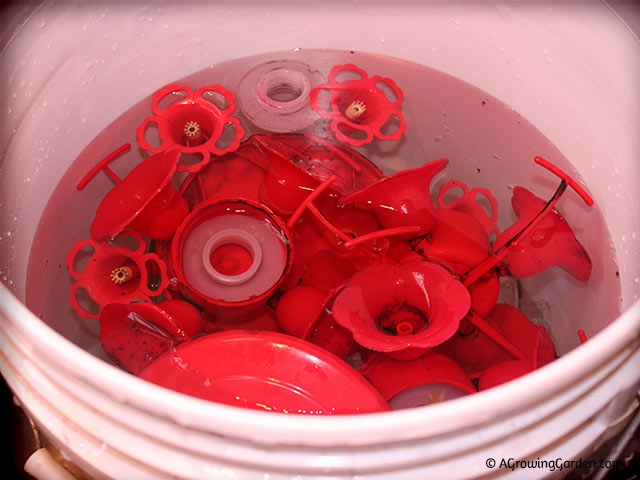
Step 5: Let everything soak in the bleach solution for about an hour. Go read a book or take a power nap. :-)
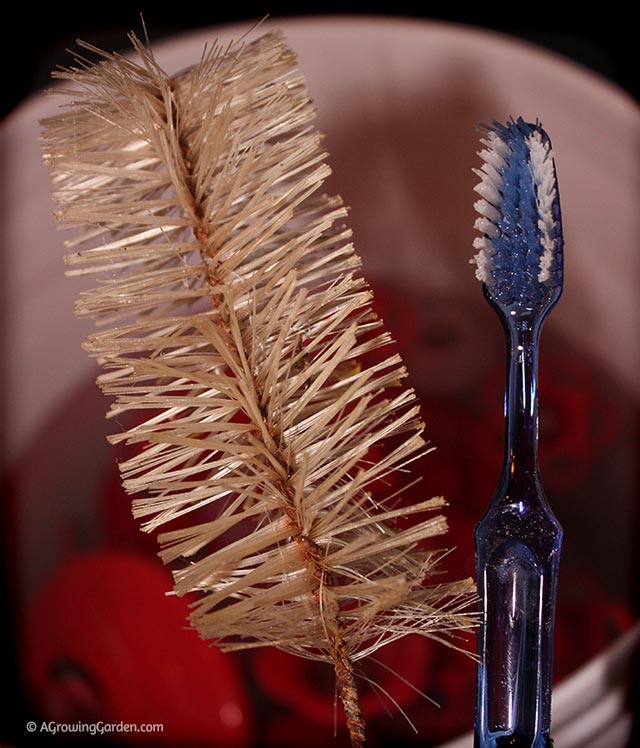
Step 6: Pull out a bottle brush and an old toothbrush and start scrubbing everything. Scrub. Scrub. Scrub. And keep scrubbing until all of the dirt and grime is removed. (*Note: this can take eons!)
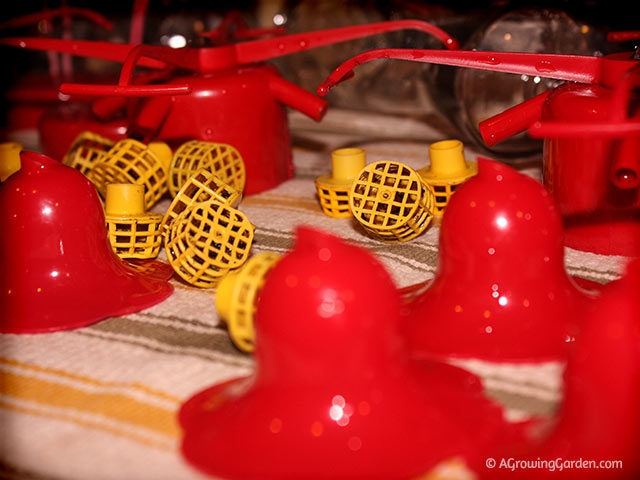
Step 7: Rinse everything really well with water.
Step 8: Spread all of the pieces out on a cloth to dry overnight. Admire how clean everything looks & pat yourself on the back. Award yourself further by eating a cookie (optional, but highly recommended).
Step 9: Once everything is dry, put all of the pieces into a paper bag, label it, and store for the winter. I reassemble the feeders before putting them away, just to be sure I don't lose any of the smaller pieces between now and next spring. Also, be sure to note where you eventually store everything ... last spring I spent a few hours looking for the feeders because I couldn't remember where I had put them!
And that's it!
It's always a sad, sad day when the hummingbirds have officially gone south for the winter. We're always sad to see them go, but if you get your feeders cleaned and ready for spring, you'll be ready for them the second they arrive again!





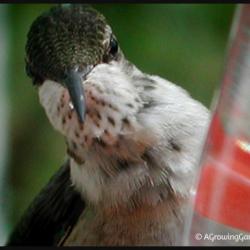
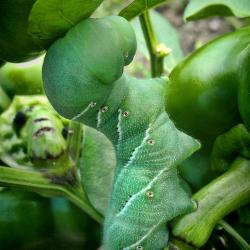
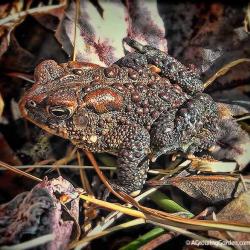
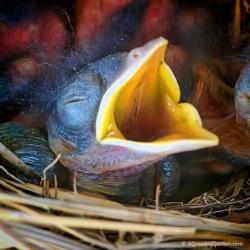



Join the Conversation!
October 14, 2013
Another way to clean your hummingbird feeders is to have a swarm of frustrated bees, bees who used to hang out on your rose of sharon bushes that got zapped in the mini drought, try access the sugar water of the hummingbird feeder. I took mine down at night, to avoid the bees, and discovered that the bee guards were all cleaned. I guess the groddy stuff was tasty to some degree.
The first time I put in the sugar water, I left it too long and got black stuff inside the glass. After that, I changed the water every few days until my three hummingbirds appropriated my feeders. After that, they would drain the feeder, so all I had to do was rinse the bottles with hot water and add more sugar water.
I did have to regularly clean the bee guards with a tooth brush ... until the bees. They did an awesome job.
My two feeders are in the basement utility closet awaiting next year's visitors. I see from your collection that I need to buy some more. Two is such a paltry number!
Reply
October 14, 2013
We don't get many bees on our feeders, so I haven't witnessed their bee guard cleaning abilities :-(
I have 4 working feeders (and lots of broken ones!) >> 3 small feeders and a larger one that I bought when we had to go out of town for a few days one summer and were worried that the small feeders would go empty. Once we've attracted the birds, we try to always have food for them in case they are relying on the food (as I'm sure they do!).
October 15, 2013
Admittedly, I could have done without the micro-swarm. Seeing my two feeders covered with bees and having them buzz all around it was very disconcerting. I imagined all sorts of dire outcomes, all of which would require hiring an expensive bee keeper or exterminator. But at night there were few bees. So, I girded my loins one night and grabbed the feeders. A neighborhood biddie told me that if I continued to leave mine out, the hummingbirds attached to them would not fly south and could get caught here. I don't know if she was right, but two of the three had left several weeks before the last one. In any case, I am hoping there shall be no more bees next year, even if it meant no scrubbing for me.
Reply
October 15, 2013
I've never heard that hummingbirds won't leave if you don't take down your feeders. Even after the ones living in your yard leave, there are others that pass through on their way south and they need to eat along the way, so I'm sure they appreciate finding feeders as they go. I always leave mine up until at least a few weeks after I've seen the last bird.
October 15, 2013
I've also read that the adults leave to go south well before the juveniles, so maybe it was the parents who left earlier & the baby stuck around a bit longer?
October 15, 2013
So glad to hear that. You know I know nothing about hummingbirds. Of course, now I feel like I chased away my last companion. I hope becomes back next year.
Reply
October 15, 2013
There have been studies that show that hummingbirds return each year to the area where they were born (hatched?), so if it was a juvenile born in your yard or neighborhood, I bet he'll be back next year! :-)
October 15, 2013
Oh, the poor baby. He was smaller than the other two. Or she. She/he would buzz my face, even coming over to the back steps where I was sitting. SIGH. I want to be homing bird central, not the hummingbird Bates Motel
Reply
July 5, 2015
I've read that you should never use highly alkaline cleaners, like bleach, because it can cause dangerous chemicals to leach out of the plastic. Use white vinegar to kill the mold on plastic parts, save the bleach for the glass parts! And rinse, rinse, and rinse again!
Reply
May 6, 2016
If you let your fewer soaklong enough in the bleach solution no scrubbing is needed.
Reply